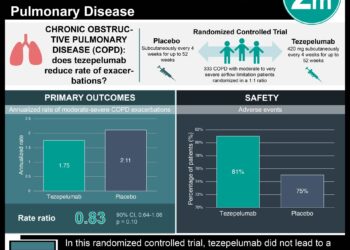Fewer adverse myocardial events in depressed patients treated with antidepressants after acute coronary syndrome
1. In this prospective cohort study, depressed patients with Acute Coronary Syndrome (ACS) who were treated with escitalopram were less likely to have Major Adverse Cardiovascular Events (MACE) than those treated with placebo during a long follow-up period.
2. Patients treated with escitalopram had significantly lower rates of myocardial infarction during follow-up but not all-cause mortality, cardiac death, nor PCI.
Evidence Rating Level: 2 (Good)
Study Rundown: Though depression has been associated with worse outcomes in patients with Acute Coronary Syndrome (ACS), it is still unclear if antidepressants improve outcomes in these patients. Previous clinical trials have suggested that antidepressants do not reduce complications during the short term, but it is less clear how antidepressants change the rate of Major Adverse Cardiac Events (MACE) over the long-term. In this Korean, prospective cohort study conducted from clinical trial patients treated with escitalopram or placebo after ACS, there were fewer MACE for patients treated with escitalopram during almost a decade of follow-up. While patients treated with escitalopram had significantly lower rates of myocardial infarction (MI) during follow-up, there was no statistical difference for all-cause mortality, cardiac death, or PCI. As expected, remission of depression was detected more often in patients treated with escitalopram than with placebo.
While these results suggest antidepressants may benefit depressed patients with ACS in terms of cardiac outcomes, a few limitations limit the generalizability of these findings. Most notably, this study took place in a single site in Korea, and it is unclear how these results generalize to other patient populations. In addition, this study enrolled more patients with less severe depression that some other similar studies, and so determining if antidepressants would benefit patients with more severe depression is warranted.
Click here to read the study in JAMA
In-Depth [prospective cohort]: 300 patients with depression and ACS from the Escitalopram for Depression in Acute Coronary Syndrome (EsDEPACS) were followed using the Korea Acute Myocardial Infarction Registry (KAMIR) for a median of 8.1 years (range 5-11 years). Inclusion criteria were history of ACS in the previous two weeks, Beck’s Depression Index indicating depression, and an evaluation by a psychiatrist confirming the depression diagnosis. The frequency of major depressive disorder was 57.0%(85/149) for the escitalopram group and 55.6% (84/151) for the placebo group while the rest had minor depression. There were similar frequencies of relevant co-variates, and so subsequent analyses were not adjusted. Patients who were treated with escitalopram had a lower incidence of MACE compared to those treated with placebo (Hazard Ratio 0.69; CI95 0.49 to 0.96). In secondary endpoint analysis, patients on who had taken escitalopram had lower incidences of subsequent MI (HR 0.54; CI95 0.27 to 0.96), but no statistically significant differences in the rates of all-cause mortality (HR 0.82; CI95 0.51 to 1.33), cardiac death (HR 0.79; CI95 0.41 to 1.52), or PCI (HR 0.58; CI95 0.33 to 1.04). 52.3% escitalopram treated patients achieved remission of their depression compared to 34.9% of placebo treated patients during the 24 month initial clinical trial.
Image: PD
©2018 2 Minute Medicine, Inc. All rights reserved. No works may be reproduced without expressed written consent from 2 Minute Medicine, Inc. Inquire about licensing here. No article should be construed as medical advice and is not intended as such by the authors or by 2 Minute Medicine, Inc.


![siRNA against antithrombin alleviates symptoms of hemophilia [PreClinical]](https://www.2minutemedicine.com/wp-content/uploads/2015/04/clot-CCWiki-350x250.jpg)




![Endostatin directly binds androgen receptors to treat prostate cancer [PreClinical]](https://www.2minutemedicine.com/wp-content/uploads/2015/01/Endostatin-75x75.jpeg)